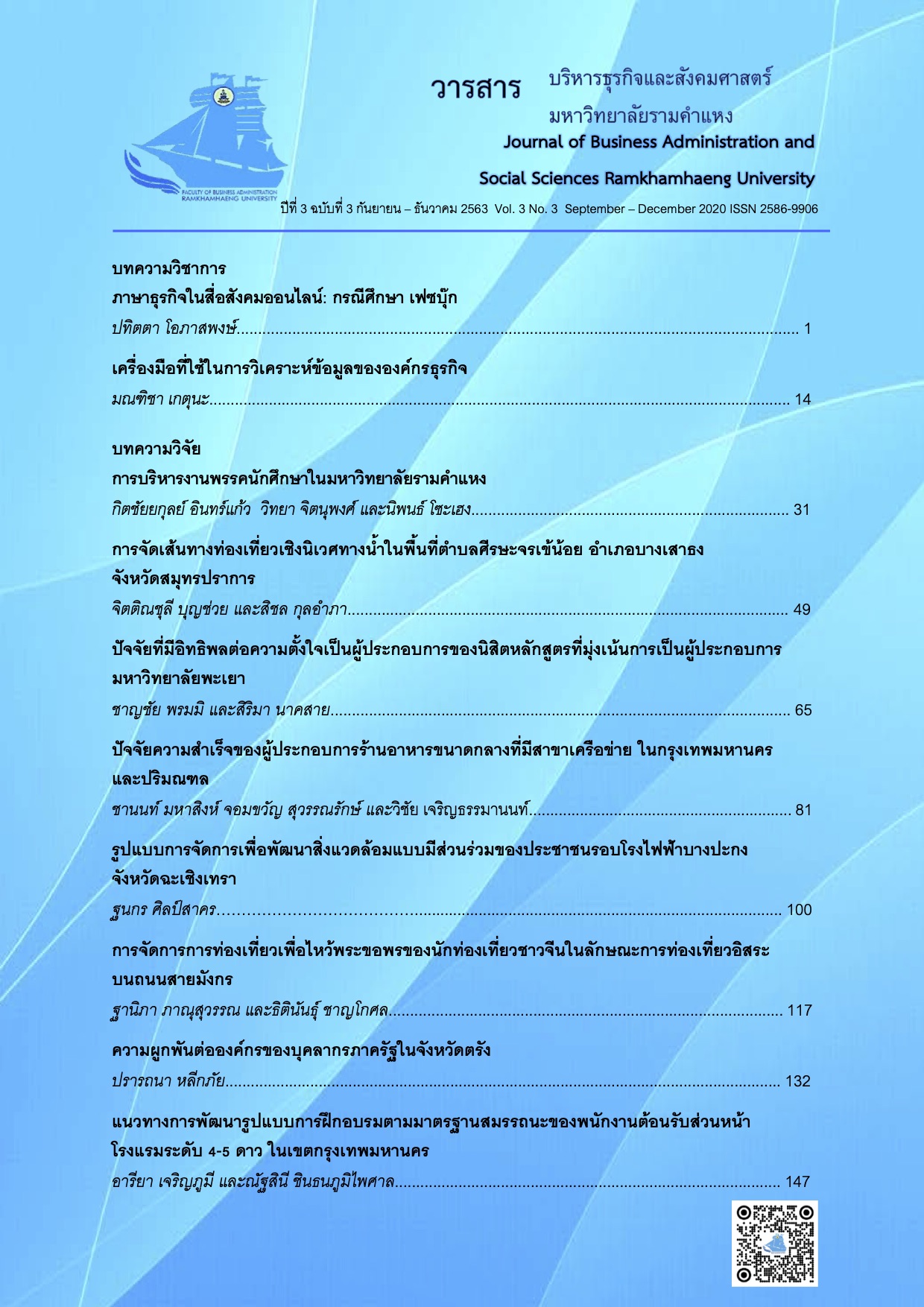Success Factors of Medium-Sized Chain Restaurant Entrepreneurs in Bangkok Metropolitan Region
Main Article Content
Abstract
In this research investigation, the researchers analyze success factors and present a success model for medium-sized chain restaurant entrepreneurs. The sample population in the qualitative research consisted of five experts in management who were the owners or managers of these restaurants, an administrator of a government agency or an organization related to the management of these restaurants, and six customers of the restaurants under study. Data analysis was conducted using the technique of content analysis. The sample population in the quantitative research consisted of 400 Thai customers using the services of medium-sized chain restaurants in the Bangkok Metropolitan Region from three brands: Mae Si Ruean; See Fah; and JeNgor’s Kitchen. The statistics used in data analysis were frequency, percentage, mean, and standard deviation. The technique of exploratory factor analysis was also employed.
Findings showed that the success factors of medium-sized chain restaurant entrepreneurs presented in the success model consisted of 1) management in six aspects: strategies; organization structure; working system; personnel management and training; management model; and building shared values and 2) responding to customer needs in five aspects: service quality; responsibilities and communication with society; food quality and worthiness for customers; restaurant location matching with the target group; and motivating sales promotion.
Article Details
เนื้อหาและข้อมูลในบทความที่ลงตีพิมพ์ในวารสารบริหารธุรกิจและสังคมศาสตร์ มหาวิทยาลัยรามคำแหง ถือเป็นข้อคิดเห็นและความรับผิดชอบของผู้เขียนบทความโดยตรง ซึ่งกองบรรณาธิการไม่จำเป็นต้องเห็นด้วย หรือร่วมรับผิดชอบใดๆ
บทความ ข้อมูล เนื้อหา รูปภาพ ฯลฯ ที่ได้รับการตีพิมพ์ในวารสารบริหารธุรกิจและสังคมศาสตร์ มหาวิทยาลัยรามคำแหง ถือเป็นลิขสิทธิ์ของวารสารบริหารธุรกิจและสังคมศาสตร์ มหาวิทยาลัยรามคำแหง หากบุคคลหรือหน่วยงานใดต้องการนำบทความทั้งหมดหรือส่วนหนึ่งส่วนใดไปเผยแพร่ต่อ หรือเพื่อกระทำการใดๆ จะต้องได้รับอนุญาตเป็นลายลักษณ์อักษรจากวารสารบริหารธุรกิจและสังคมศาสตร์ มหาวิทยาลัยรามคำแหง ก่อนเท่านั้น
References
กระทรวงพาณิชย์. (2562). ธุรกิจร้านอาหาร. บทวิเคราะห์ธุรกิจ กรมพัฒนาธุรกิจการค้า ประจำเดือน กุมภาพันธ์ 2562.
กัญสุดา เชิดชูถิ่น. (2559). ปัจจัยที่มีผลต่อความสำเร็จของผู้ประกอบการร้านอาหารทะเล เขตบางขุนเทียนชายทะเล จังหวัดกรงุเทพมหานคร. การค้นคว้าอิสระ ศิลปศาสตรมหาบัณฑิต. สาขาวิชาการจัดการอุตสาหกรรมการบริการและการท่องเที่ยว, มหาวิทยาลัยกรุงเทพ.
ธีรกิติ นวรัตน ณ อยุธยา. (2557). การตลาดบริการ แนวคิดและกลยุทธ์. กรุงเทพฯ : สำนักพิมพ์แห่งจุฬาลงกรณ์มหาวิทยาลัย.
ลงทุนแมน. (2562). ตัวอย่างธุรกิจร้านอาหารไทย รายได้ร้อยล้าน. สืบค้นเมื่อ 10 สิงหาคม 2563, จาก https://www.longtunman.com/14088
ธานินทร์ ศิลป์จารุ. (2560). การวิจัยและวิเคราะห์ข้อมูลทางสถิติด้วย SPSS และ AMOS (พิมพ์ครั้งที่ 18). กรุงเทพฯ: บิสซิเนสอาร์แอนด์ดี.
ประชาชาติธุรกิจ. (2562, สิงหาคม 20). ส่องเทรนด์ธุรกิจร้านอาหาร…ยังน่าลงทุนอยู่หรือไม่? สืบค้นจาก https://www.prachachat.net/finance/news-353428/.
วิชัย เจริญธรรมานนท์. (2555). แบบฝึกปฏิบัติชุดวิชาการจัดการห้องพักและการจัดการอาหารและเครื่องดื่ม (Room Division and Food and Beverage Management). นนทบุรี: สำนักพิมพ์มหาวิทยาลัยสุโขทัยธรรมาธิราช.
สว่างพงษ์ แซ่จึง. (2559). ปัจจัยแห่งความสำเร็จในการประกอบธุรกิจแฟรนไชส์ร้านอาหาร ประเภทก๋วยเตี๋ยว ในเขตจังหวัดชลบุรี. วิทยานิพนธ์บริหารธุรกิจมหาบัณฑิต. วิทยาลัยพาณิชยศาสตร์, มหาวิทยาลัยบูรพา.
Camillo, A. A., Connolly D. J., & Kim W. G. (2008). Success and Failure in Northern California: Critical
Success Factors for Independent Restaurants. Cornell Hospitality Quarterly. 49(4), 364-380
DiPietro, R. B., Murphy, K. S., Rivera, M., & Muller, C. C. (2007). Multi‐unit management key success factors in the casual dining restaurant industry. International journal of contemporary hospitality management, 19(7), 524-536.
Hair, J. F., Jr., Black, W. C., Babin, B. J., & Anderson, R. E. (2010). Multivariate Data Analysis (7th ed). New Jersey: Prentice Hall.
Muller, C. C., & DiPietro, R. B. (2007). A theoretical framework for multi-unit management development in the 21st century. Journal of Foodservice Business Research, 9(2-3), 7-25.
Waterman, R. H., Jr., Peters, T., & Phillips, T. (1980). Business Horizons: Structure is not organization. The Journal of the Kelley School of Business, Indiana University, 23(3), 14-26.
Wyckoff, D. D. & Sasser. W. E. (1978). The Chain Restaurant Industry. Lexington Books.


